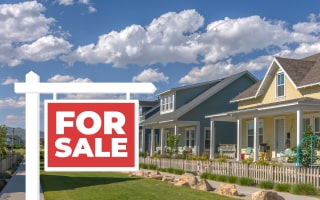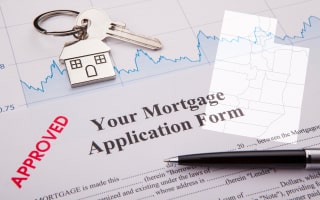Home Buying in Utah

Utah, known as the Beehive State, symbolizing the values of industry, cooperation, and hard work, is known for its stunning landscapes, robust economy, and fast-growing cities. The state offers diverse living environments, from the towering Wasatch Mountains near Salt Lake City to the red rock deserts of southern Utah, making it appealing to a variety of homebuyers. Whether you're attracted to Utah's outdoor recreation, booming tech industry, or family-friendly communities, there's something for everyone.
Utah's housing market has seen significant growth in recent years, driven by a thriving economy, a surge in tech jobs, and an influx of new residents. Utah's population has been growing rapidly and is projected to grow faster than the national average. However, this growth has led to rising home prices and increased competition, particularly in cities like Salt Lake City, Provo, and Lehi. While some regions of the state still offer more affordable options, buyers must be prepared for a competitive market, especially in urban centers.
The median home price in Utah is around $525,000, which is higher than the national average and higher than in neighboring Arizona, Nevada, and Wyoming. However, home prices are even higher in areas like Park City and Salt Lake City, where tech professionals and outdoor enthusiasts converge. More affordable housing can be found in suburban or rural areas, but even these regions are experiencing price increases as more people move to the state. Despite the rising costs, Utah remains a desirable place for first-time buyers and seasoned investors, thanks to its strong job market and high quality of life.
Utah is a seller's market, and navigating its landscape can be challenging due to limited inventory and quick sales. Working with an experienced local real estate agent is essential to help buyers understand market trends, identify the right areas, and act fast when the right home becomes available. Preparing finances ahead of time and staying informed about local market conditions will ensure a smoother homebuying experience in this fast-paced market.
Current Utah Housing Trends
Utah's housing market is influenced by several factors, including economic growth, population increases, and a shortage of available homes. These trends have made the state's housing market more competitive, with buyers needing to stay informed and prepared to make swift decisions.
Pay attention to these trends:
-
Median Home Price
The median home price in Utah is around $525,000, well above the national average. The Salt Lake City metropolitan area has some of the highest home prices in the state, with median prices exceeding $550,000. In contrast, more affordable housing can be found in places like Ogden, where the median price is closer to $425,000. Utah's rapidly growing tech sector, particularly in Silicon Slopes (between Salt Lake City and Provo), has driven much of this price increase, with many tech workers and their families looking to settle in the region.
-
Number of Homes Sold
Utah sees approximately 3,500 homes sold monthly, with most transactions occurring in the Wasatch Front, the densely populated region stretching from Ogden to Provo. This area has seen significant population growth, further intensifying competition for homes. Rural areas, such as those in southern Utah, experience slower sales but are becoming more popular due to the state's natural beauty and outdoor recreation opportunities.
-
Median Days on Market (DOM)
Homes in Utah tend to sell quickly, especially in urban areas. The average home stays on the market for about 30 days, though properties can sell within two weeks in hotter markets like Salt Lake City and Lehi. In rural or remote areas, homes may take longer to sell, but even these regions have seen a decrease in DOM as more people look to escape the higher prices of urban centers.
-
Housing Supply
Utah is facing a housing shortage, particularly in its growing cities. The state currently has a housing supply of around 1.2 months, far below the 5–6 months needed for a balanced market. New construction has struggled to keep pace with the demand, especially in areas like Salt Lake City, where land is limited, and in popular tourist areas like Park City, where second homes and vacation properties are in high demand.
How to Find the Right Home in Utah

Navigating Utah's fast-paced housing market requires careful planning and preparation. Working with a knowledgeable real estate agent who understands the state's market trends is essential to finding the right home at the right price.
Choosing the Right Home
When searching for a home in Utah, several factors should guide your decision, including location, property type, and the local real estate market.
Location
Utah offers diverse living environments, from bustling cities to quiet rural areas. Each has its advantages, depending on your lifestyle and housing needs.
-
Urban vs. Suburban vs. Rural: Cities like Salt Lake City and Provo are the economic and cultural hubs of Utah, offering job opportunities, entertainment, and access to public transportation. Suburban areas, such as Draper and South Jordan, provide a family-friendly environment with larger homes and proximity to urban centers and outdoor recreation. Rural areas, including Moab and St. George, appeal to those seeking more space, lower costs, and easy access to Utah's natural wonders.
-
Proximity to Work: Utah's economy is centered around Salt Lake City and the surrounding Wasatch Front. Tech, healthcare, and education are major industries in the state, with many job opportunities concentrated in cities like Lehi, home to Silicon Slopes. For those commuting to these hubs, living in suburban areas like Herriman or Eagle Mountain can offer more affordable housing while still being close to work.
-
Public Transportation: Utah has a well-developed public transportation system, particularly in the Wasatch Front. The Utah Transit Authority (UTA) operates buses, light rail (TRAX), and commuter trains (FrontRunner), making commuting in the Salt Lake City metro area convenient. Access to these systems is a key consideration for homebuyers who want to minimize their reliance on cars.
-
Property Taxes: Utah's property tax rate is relatively low, averaging around 0.58%. However, this can vary depending on the county. Property taxes are higher in more densely populated areas like Salt Lake City and Park City, but lower in rural regions. These taxes are an important factor to consider when budgeting for homeownership.
Type of Home
Utah offers various housing types to suit different preferences, from modern city condos to expansive rural properties.
-
Single-Family Homes: The most common type of housing in Utah, single-family homes are found throughout the state in urban and suburban areas. These homes typically offer more space and privacy, with larger lots in the suburbs and rural areas. In growing cities like Lehi, new developments are expanding the availability of single-family homes, though prices are rising rapidly due to demand.
-
Condos and Townhomes: Condos and townhomes are popular in Utah's urban centers and fast-growing suburban areas. They offer a lower-maintenance lifestyle with shared amenities, making them ideal for young professionals, retirees, or those who prefer a more communal living arrangement. Condos are especially prevalent in downtown Salt Lake City, while townhomes are common in the suburbs.
-
Luxury Homes and Second Properties: Utah's luxury home market thrives, particularly in resort areas like Park City and Deer Valley. These homes often have high-end amenities, stunning mountain views, and easy access to world-class skiing and hiking. Many luxury properties in these areas are purchased as second homes or vacation rentals, attracting out-of-state buyers and international investors.
-
Rural and Ranch Properties: Utah's vast rural areas are perfect for those seeking space and solitude. Ranch properties are common in the southern and eastern parts of the state, where large parcels of land are available for agriculture, livestock, or simply enjoying the outdoors. These properties are also popular among those looking to escape the busier urban areas.
The Home Buying Process in Utah
The home-buying process in Utah is like that in other states, though buyers should be aware of a few unique aspects of the state's market.
Steps to buying a home in Utah include:
- Get prequalified for a mortgage.
- Find a local real estate agent.
- Make an offer.
- Schedule a home inspection.
- Close on your new home.
Financing Your Utah Home Purchase

Homebuyers in Utah have several financing options, including traditional mortgages and government-backed loans.
![]() Traditional Mortgages
Traditional Mortgages
There are two types of traditional mortgages available to Utah home buyers:
- Fixed-Rate Mortgages: These loans offer a fixed interest rate for the life of the loan, making them a stable option for buyers who plan to stay in their homes long-term. Fixed-rate mortgages are popular in Utah due to their predictability in a market where home prices are rising.
- Adjustable-Rate Mortgages (ARMs): ARMs offer a lower initial interest rate, which can appeal to buyers who plan to sell or refinance within a few years. However, these rates can increase over time, making them a riskier option if you plan to stay in the home long-term.
Leading lenders in Utah, such as Zions Bank and America First Credit Union, are popular choices among homebuyers for securing traditional mortgages. These financial institutions are well-known for offering competitive rates and a variety of mortgage products tailored to the needs of Utah residents. With their strong local presence and commitment to customer service, they have earned a reputation as trusted partners in providing reliable financing solutions for homebuyers throughout the state.
![]() Government-Backed Loans
Government-Backed Loans
- FHA Loans: FHA loans, backed by the Federal Housing Administration, are popular among first-time buyers and those with lower credit scores. These loans require a smaller down payment than conventional loans, making them a good option for many Utah homebuyers.
- VA Loans: Veterans and active-duty military members can take advantage of VA loans, which offer competitive interest rates and often require no down payment.
- USDA Loans: USDA loans offer low-interest financing with no down payment for buyers in rural parts of Utah. These loans are designed to help buyers in areas with lower population density, making them a great option for those purchasing property in Utah's rural regions.
![]() Down Payment Assistance Programs
Down Payment Assistance Programs
Utah offers several down payment assistance programs to help first-time buyers and others who may struggle with the upfront costs of purchasing a home. The Utah Housing Corporation (UHC) offers a range of programs designed to assist homebuyers, particularly those with low to moderate incomes. The First-time Homebuyers Assistance Program provides up to $20,000 in assistance to qualifying first-time homebuyers in the state.
In addition to state programs, local governments and counties in Utah may also offer down payment assistance. Check with your city or county housing authorities for specific programs that could help reduce your upfront costs.
Home Insurance in Utah

Home insurance is critical when buying a home in Utah, particularly due to the state's susceptibility to natural disasters like wildfires and earthquakes. Utah's average annual cost of homeowners insurance is around $1,500, below the national average. However, homes in areas prone to natural hazards may face significantly higher premiums.
Wildfire risk can increase insurance costs for properties near forests or dry areas. Additionally, buyers in earthquake-prone regions, especially along the Wasatch Fault, should consider purchasing additional earthquake insurance, as standard home insurance policies do not typically cover earthquake damage.
Home Buying Challenges in Utah
While Utah offers many advantages to homebuyers, the state's housing market comes with its challenges. Prospective buyers should be aware of these issues when planning their home purchase.
-
Rising Home Prices: Utah's housing prices have increased significantly recently, particularly in and around Salt Lake City and Provo. As demand continues to outpace supply, it can be difficult for first-time buyers to find affordable homes in desirable areas.
-
Limited Inventory: Like many states, Utah faces a housing shortage, particularly in its urban centers. New construction has not kept up with population growth, especially in high-demand areas like Silicon Slopes. As a result, buyers often face bidding wars and may need to act quickly when a home becomes available.
-
Natural Disasters: Utah's susceptibility to wildfires, earthquakes, and even floods can complicate the home-buying process. Buyers should factor in the potential for natural disasters when choosing a home and ensure they have the appropriate insurance coverage to protect their investment.
-
Zoning and Land Use Restrictions: Utah has implemented several land use and zoning restrictions, particularly in cities experiencing rapid growth. This can limit the availability of land for new construction and drive up the price of homes in those areas.
Utah Home Inspections
High winds, extreme heat and cold, and flash floods are common in Utah, putting property in danger. A Utah home inspection protects the buyer from making a purchase mistake by revealing any hidden structural, functional, or cosmetic issues. Not only can the buyer save money by not having to make costly repairs, but they can also use these issues to negotiate a better deal.
A home inspection in Utah assesses the house's structural integrity, major systems, appliances, and safety features. Some of the items included in a Utah home inspection are:
-
Structure: Foundation, walls, columns, chimney, crawlspaces.
-
Attic: Framing, sheathing, insulation, ventilation, electricity, HVAC, and ductwork.
-
Roof: Shingles, flashing, skylights, and gutters.
-
Garage: Doors, door opener, fire separation, walls/ceiling, slab, cabinets.
-
Plumbing: Supply line, main valve, pumps, water heaters, and fixtures (toilets, sinks, tubs, faucets, showers).
-
HVAC: Heating and cooling systems, ductwork, ventilation.
-
Electric: Panels, circuit breakers, outlets, and fault breakers.
-
Interior: Walls, floors, doors, windows, doorbell, closets, ceilings.
-
Safety: Smoke detectors, carbon monoxide alarms, and fire sprinklers.
-
Grounds: Walkways, grading, drainage, driveway, and other property areas.
The Process
In Utah real estate transactions, the buyer pays for the home inspection because it benefits them while conducting due diligence. The general process is as follows:
- Choose a reputable, local home inspection company.
- Schedule a home inspection at the right time, according to the contract.
- Show up on time and attend the inspection; ask questions as necessary. It takes between two and three hours to complete.
- Review the inspection report and decide where to go from there.
The top five home inspection companies in Utah are:
- JODA Home Inspections - South Jordan, UT
- Behind the Scenes Home Inspections - Eagle Mountain, UT
- OnSite Home Inspections - Provo, UT
- Town & Country Home Inspections - Fayetteville, UT
- A1 Utah Home Inspector - Midway, UT
After the Inspection
After the inspection is complete, the inspector sends a copy of the final report to all interested parties. The buyer then has some options on how to proceed. If the report shows serious issues that should be resolved, the buyer can:
- Try to save some money by negotiating a better price.
- Ask the seller to make all the necessary repairs before closing.
- They can back out of the sale and walk away without losing any money.
- Ask for a home warranty or lower down payment.
Inspection Top Cities
| City | Inspection Cost | Local Issues | Local Rules | Local Home Types |
|---|---|---|---|---|
| Home Inspection in Salt Lake City | $350-$850 depending on the home's size, and age. | Roofing, electrical, wiring problems, poor attic ventilation and insulation. | Not legally mandated. | Single-family homes, brick bungalows, Colonial, and Victorian homes. |
| Home Inspection in West Valley City | $350-$850 based on the home's age, size, and location. | Roof, electrical, HVAC, and plumbing. | No local rules. | Single-family, condos, townhouses, multi-family homes, and land. |
| Home Inspection in West Jordan | $350-$850 based on the home's size, age, and specific services needed. | Roof, electrical, plumbing, and foundation. | No local rules. | Single-family, townhouses, condos, and duplexes. |
| Home Inspection in Provo | $350-$850 based on the size, age, and condition of the property. | Roof, plumbing, electrical, foundation cracks, water damage, and mold. | No local rules. | Single-family homes, multi-family units, and resort-style properties. |
| Home Inspection in St. George | $350-$850 based on many factors like the home's age, size, and complexity. | Roofing, electrical, plumbing, foundation and HVAC. | None. | South-western, Mediterranean, and Adobe. |
Navigating Utah's Home Buying Journey
Home buying in Utah can be an exciting and rewarding experience, but it's important to be prepared for the challenges of the state's competitive housing market. Whether you're seeking a modern condo in Salt Lake City, a spacious suburban home in the Wasatch Front, or a rural retreat in southern Utah, there's something for everyone in the Beehive State.
Working with a knowledgeable local real estate agent is essential to navigate the complexities of Utah's housing market. An agent can help you understand regional trends, find the best financing options, and guide you through the entire home-buying process.
By staying informed about current market conditions, taking advantage of down payment assistance programs, and being prepared for Utah's unique environmental challenges, you can find and purchase the perfect home in this diverse and beautiful state.
Instant Access to Utah Property Records
- Owner(s)
- Deed Records
- Loans & Liens
- Values
- Taxes
- Building Permits
- Purchase History
- Property Details
- And More!